Greeting words
七年级外研版英语全册学习资料
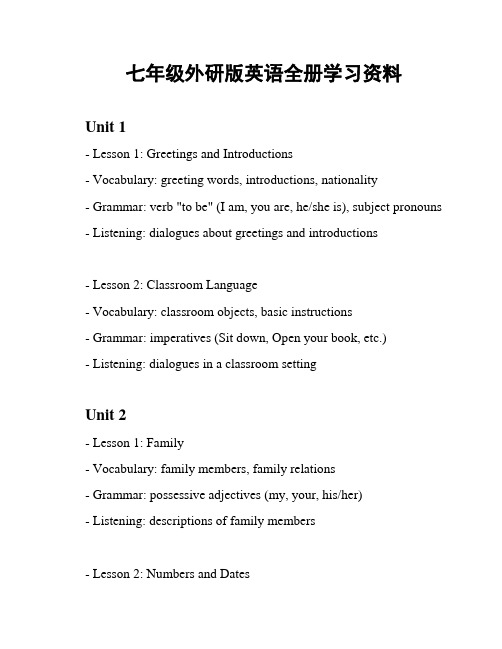
七年级外研版英语全册学习资料Unit 1- Lesson 1: Greetings and Introductions- Vocabulary: greeting words, introductions, nationality- Grammar: verb "to be" (I am, you are, he/she is), subject pronouns - Listening: dialogues about greetings and introductions- Lesson 2: Classroom Language- Vocabulary: classroom objects, basic instructions- Grammar: imperatives (Sit down, Open your book, etc.)- Listening: dialogues in a classroom settingUnit 2- Lesson 1: Family- Vocabulary: family members, family relations- Grammar: possessive adjectives (my, your, his/her)- Listening: descriptions of family members- Lesson 2: Numbers and Dates- Vocabulary: numbers 1-100, days of the week, months of the year - Grammar: counting numbers, ordinal numbers (first, second, etc.) - Listening: conversations about dates and numbersUnit 3- Lesson 1: School Life- Vocabulary: subjects, school facilities, activities- Grammar: present continuous tense (I am studying, he/she is playing)- Listening: discussions about school life- Lesson 2: Leisure Activities- Vocabulary: hobbies, sports, leisure activities- Grammar: can/can't (I can swim, he/she can't dance)- Listening: conversations about leisure activities... (continue with the remaining units and lessons) ...ConclusionThis document provides an overview of the learning materials covered in the 7th-grade textbook of the "Foreign Research Edition" English course. Each unit consists of two lessons, focusing on different topics, vocabulary, grammar, and listening exercises. The document serves as a helpful guide for students, teachers, and parents to understand the content and structure of the course.。
邮件回应客人问候常用语英文
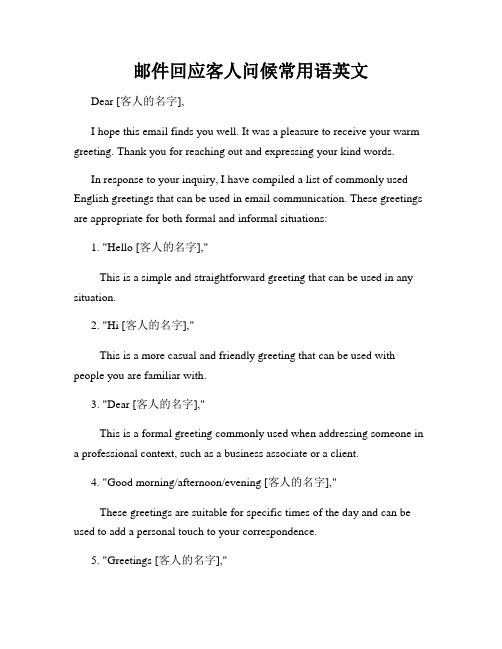
邮件回应客人问候常用语英文Dear [客人的名字],I hope this email finds you well. It was a pleasure to receive your warm greeting. Thank you for reaching out and expressing your kind words.In response to your inquiry, I have compiled a list of commonly used English greetings that can be used in email communication. These greetings are appropriate for both formal and informal situations:1. "Hello [客人的名字],"This is a simple and straightforward greeting that can be used in any situation.2. "Hi [客人的名字],"This is a more casual and friendly greeting that can be used with people you are familiar with.3. "Dear [客人的名字],"This is a formal greeting commonly used when addressing someone in a professional context, such as a business associate or a client.4. "Good morning/afternoon/evening [客人的名字],"These greetings are suitable for specific times of the day and can be used to add a personal touch to your correspondence.5. "Greetings [客人的名字],"This is a slightly more formal and generic greeting that can be used as a neutral alternative to other greetings.After the initial greeting, it is common to include a sentence or two to acknowledge the content of the recipient's email or to provide a brief update on your own situation. Here are some examples:- "Thank you for your email. I appreciate your kind words and wanted to take a moment to express my gratitude."- "I hope this email finds you well. I wanted to touch base and provide an update on the project we discussed during our last meeting."- "I hope you had a great weekend. I wanted to discuss the upcoming event and see if you have any further questions or concerns."In addition to greetings, it is also important to use appropriate closing phrases to conclude your email. Here are some suggestions:- "Best regards,"- "Yours sincerely,"- "Thank you,"- "Kind regards,"- "With gratitude,"These closing phrases can vary in formality depending on the nature of your relationship with the recipient. It is crucial to select a closing phrase that matches the tone of your email.I hope you find these examples helpful. If you have any further questions or need assistance with anything else, please don't hesitate to let me know. I am always happy to help.Best regards,[你的名字]。
社交类英文单词

社交类英文单词Socializing is an essential part of our daily lives. Whether it is through face-to-face interactions or online platforms, communication and connection are vital for building relationships, sharing ideas, and expanding our social networks. In this article, we will explore a list of common socializing-related English words that will help you navigate various social situations.1. GreetingGreeting is the first step in socializing and sets the tone for the interaction. Here are some commonly used greeting words and phrases:- Hello- Hi- Hey- Good morning/afternoon/evening- How are you?- What's up?- Nice to meet you- How have you been?2. IntroducingIntroducing oneself or others is an essential skill in socializing. Here are some phrases you can use when introducing yourself or someone else:- My name is [your name]- Let me introduce myself. I'm [your name]- This is [name]. [He/she] is my [relationship]- Have you met [name]? They are [description]3. Small TalkSmall talk is a way to break the ice and engage in casual conversation. Here are some topics and phrases you can use to initiate small talk:- Weather: "Nice day, isn't it?"- Hobbies and Interests: "Do you have any hobbies?"- Current Events: "Did you hear about the latest news?"- Weekend Activities: "Any plans for the weekend?"- Travel: "Have you been anywhere interesting lately?"4. Conversation SkillsHaving good conversation skills is crucial for meaningful social interactions. Here are some words and phrases that can help you maintain a conversation flow:- Listening: "That's interesting."- Asking for opinions: "What do you think about...?"- Expressing agreement: "I agree with you."- Offering suggestions: "Maybe we could..."- Asking follow-up questions: "Can you tell me more about...?"5. Social EventsAttending social events provides numerous opportunities for networking and meeting new people. Here are some words and phrases related to social events:- Party: "Are you going to the party tomorrow?"- Gathering: "There's a family gathering at my place."- Conference: "Are you attending the conference next week?"- Meetup: "We should organize a meetup for like-minded individuals."- Networking event: "There's a networking event happening next month."6. Digital SocializingIn today's digital age, socializing has extended to online platforms. Here are some words and phrases related to digital socializing:- Social media: "I saw your post on social media."- Online chat: "Let's catch up through online chat."- Virtual meeting: "We're having a virtual meeting later."- Video call: "Can we have a video call tomorrow?"- Online community: "I'm part of an online community dedicated to photography."7. FarewellEnding a conversation or social interaction politely is as important as starting it. Here are some phrases you can use when bidding farewell:- Goodbye- See you later- Take care- Have a great day/weekend- It was nice talking to youConclusion:Socializing is a fundamental aspect of human interaction, and having a strong command of socializing-related English words can greatly enhance your communication skills. By using the words and phrases mentioned in this article, you will be able to navigate various social situations with confidence and build meaningful connections with others. Remember, practice makes perfect, so don't hesitate to apply these words in real-life scenarios to become a skilled socializer.。
不同打招呼方式英语作文
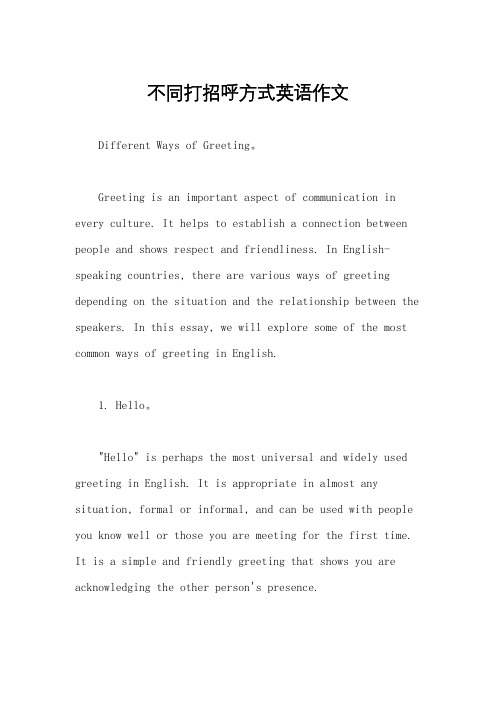
不同打招呼方式英语作文Different Ways of Greeting。
Greeting is an important aspect of communication in every culture. It helps to establish a connection between people and shows respect and friendliness. In English-speaking countries, there are various ways of greeting depending on the situation and the relationship between the speakers. In this essay, we will explore some of the most common ways of greeting in English.1. Hello。
"Hello" is perhaps the most universal and widely used greeting in English. It is appropriate in almost any situation, formal or informal, and can be used with people you know well or those you are meeting for the first time. It is a simple and friendly greeting that shows you are acknowledging the other person's presence.Example: "Hello, how are you today?"2. Hi。
"Hi" is a more casual and informal version of "hello." It is often used among friends, family, and colleagues, but may not be suitable in more formal situations. It is a friendly and relaxed greeting that shows you are comfortable with the other person.Example: "Hi, what's up?"3. Good morning/afternoon/evening。
简单的英语问候语
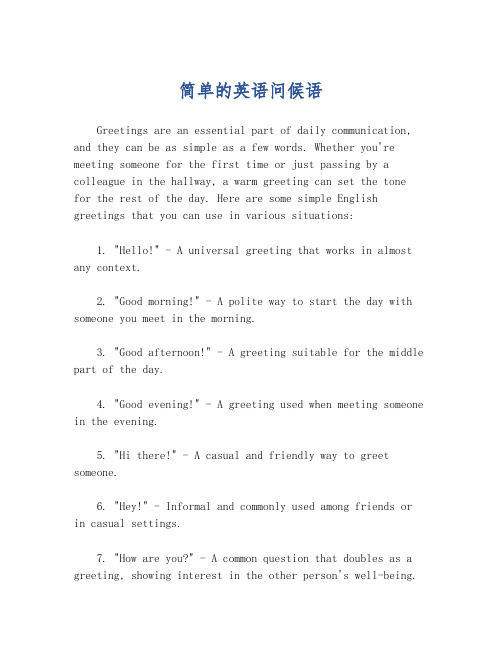
简单的英语问候语Greetings are an essential part of daily communication, and they can be as simple as a few words. Whether you're meeting someone for the first time or just passing by a colleague in the hallway, a warm greeting can set the tonefor the rest of the day. Here are some simple English greetings that you can use in various situations:1. "Hello!" - A universal greeting that works in almost any context.2. "Good morning!" - A polite way to start the day with someone you meet in the morning.3. "Good afternoon!" - A greeting suitable for the middle part of the day.4. "Good evening!" - A greeting used when meeting someone in the evening.5. "Hi there!" - A casual and friendly way to greet someone.6. "Hey!" - Informal and commonly used among friends or in casual settings.7. "How are you?" - A common question that doubles as a greeting, showing interest in the other person's well-being.8. "It's nice to meet you!" - A greeting used when you're introduced to someone new.9. "What's up?" - A casual greeting often used among peers, asking about recent happenings.10. "Long time no see!" - A friendly way to greet someone you haven't seen in a while.11. "How's it going?" - A greeting that inquires about the person's current state or activities.12. "Howdy!" - A more old-fashioned or regional greeting, often used in a warm and friendly manner.13. "Greetings!" - A formal way to greet someone, often used in writing.14. "Welcome!" - A greeting used to make someone feel at home or to acknowledge their arrival.15. "Take care!" - A parting greeting that wishes someone well.Remember, the tone and body language you use when saying these greetings can be just as important as the words themselves. A genuine smile and eye contact can make even the simplest greeting feel warm and sincere.。
英语简单问候语ppt课件

Hello!
你好!
Hello!
新单词 New words
hello
你好
fine
好的; 健康的
how
怎样
and
和;以及
thank
谢谢
very
非常
good
好
抢答环节 英译中
good
好的
hello
你好
how
怎样
抢答环节 英译中
fine
好的; 健康的
and
和; 以及
very
非常
抢答环节 中译英
英语问候语
你好! 怎么用你英好语
打招呼呢?
课程内容
Course content
学习新单词
Learn new words
英语问候
English greeting
情景练习
Scene practice
答疑解惑
Questions and answers
01 学习新单词 Learn new words
学习新单词 learn new words
--------我很好,谢谢
I am fine. Thanks.
--------不是很好。
Not very good.
教学分析 Analysis of teaching
hello
你好
How are you?
他们有什么区 别呢?
Hello 和 How are you?
Hello ;Hi
意思是“喂”,比较随意, 用于熟人打招呼
谢谢
thank
好的; 健康的
fine
好
good
抢答环节 中译英
你好
英语课堂教学用语
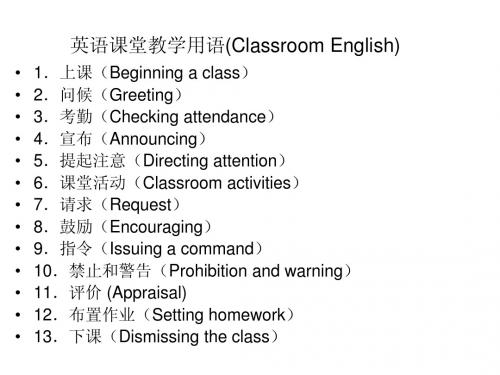
1.上课(Beginning a class)
• (1)Let’s start now./Let’s begin our class/ lesson. • (2)Stand up,please. • (3)Sit down,Pease.
2.问候(Greeting)
• (4)Hello,boys and girls/children. • (5)Good morning,class/everyone/ everybody/children/boys and girls. • (6)Good afternoon,class/everyone/ everybody/children/boys and girls. • (7)How are you today?
• (33)Listen carefully,please. • (34)Listen to the tape recorder/the recording. • (35)Look carefully,please. • (36)Look over here. • (37)Watch carefully. • (38)Are your watching? • (39)Please look at the black-board/picture /map… • (40)Pay attention to your spelling/ pronunciation.
6.课堂活动(Classroom activities)
• (41)Start!/Start now. • (42)Everybody together./All together. • (43)Practise in a group./Practise in groups/In groups,please. • (44)Get into groups of three/four… • (45)Every body find a partner/friend. • (46)In pairs,please.
请假条的英文翻译
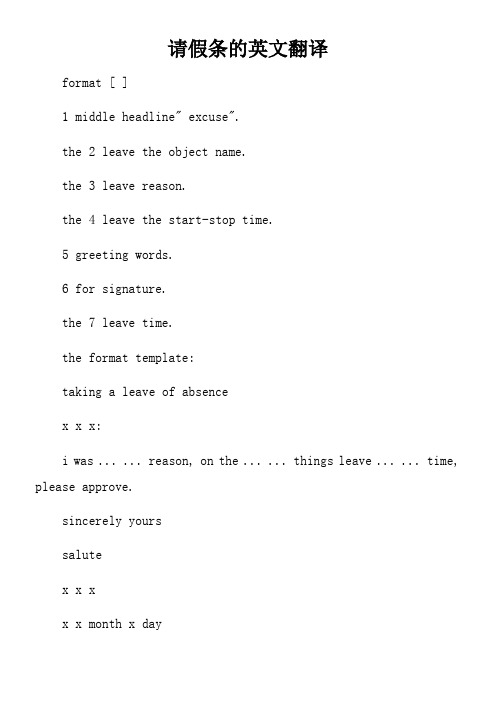
请假条的英文翻译format [ ]1 middle headline" excuse".the 2 leave the object name.the 3 leave reason.the 4 leave the start-stop time.5 greeting words.6 for signature.the 7 leave time.the format template:taking a leave of absencex x x:i was ... ... reason, on the ... ... things leave ... ... time, please approve.sincerely yourssalutex x xx x month x daycontent ( format )1 title.in 2 called.the 3 reason for leave.the 4 leave the start-stop time.5 greeting words.6 for signature.the 7 leave time.( examples for reference )please leave athe xx training center:because of our staff of the general assembly held on the evening of january 10th, no person shall absent in late january 10th, so i cannotback to school to attend the training. we take, ken hope approval!sincerely yourssalutexx bank haizhu branchsales department liu xxin january 8, XXenglish classnote formatnote ( written request for leave ) is an english learner must master one of the commonly used pa-pe-r, which comprises a sick leave ( note for sick leave ) and please leave ( leave ofabsence ). leave is used to the teacher or leader because of poor health or because of something that asked for leave of absence.english diary writing should pay attention to three points:in 1 english diary writing and chinese for the same, it generally consists of four parts, namely the time, call, text and signature.2 in general, can be found a note is a si-mp-le writing style. for a general written on pa-pe-r, no envelope. the format of writing and correspondence has many similarities, the correspondence is greatly simplified.the 3 clais characterized by the requirement of come to the point, content words brief, user-friendly.2 distinguished leadership:because i * * * * reason, will not be able to * * * * *, please lead to give care.sincerely yoursceremonyleave: * * * * * * ** * * * * * * * * * * daysurname name leave things forfor the number of days from the month day hour day month / date tothe transfer of workviewsapproval of the leadershipnote: for a complete two copies, one copy is given to the company's hr department, a stay in the department of.in second copies:company staff leave.surname name years age into the company time year monthleave type leave family leave sick leave maternity leave marriage leave bereavement leave to run a businessholiday beginning on days when the holiday time month day hourleave fordepartment manager signature signed by the general manager2content ( format )1 title.in 2 called.the 3 reason for leave.the 4 leave the start-stop time. 1 2 35 greeting words.6 for signature.the 7 leave time.( examples for reference )please leave athe xx training center:because of our staff of the general assembly held on the evening of january 10th, no person shall absent, so i can not return to training late in january 10th. we take, ken hope approval!sincerely yourssalute!xx bank haizhu branchsales department liu xxin january 8th 2xxxtaking a leave of absence:due to it can not participate inactivity, we take, hope approval. sincerely yourssaluteleave one:year, month and daycertificate signature:southern china normal university zhongshan ji xin practice team in threetaking a leave of absence:due towe take, hope approval.sincerely yourssaluteleave one:year, month and daycertificate signature:southern china normal university zhongshan ji xin practice team in threeplease leave the ( storage root )name positioncausetime year month day year month day hour -- approval managerin charge ( of )leading sectorleadershipposturedate year month day pin dummy signature please leave aname positioncausetime year month day year month day hour -- approval managerin charge ( of )leading sectorleadershipposturedate year month day pin dummy signature 2.【格式】1.居中写题目“请假条”。
greeting英文作文
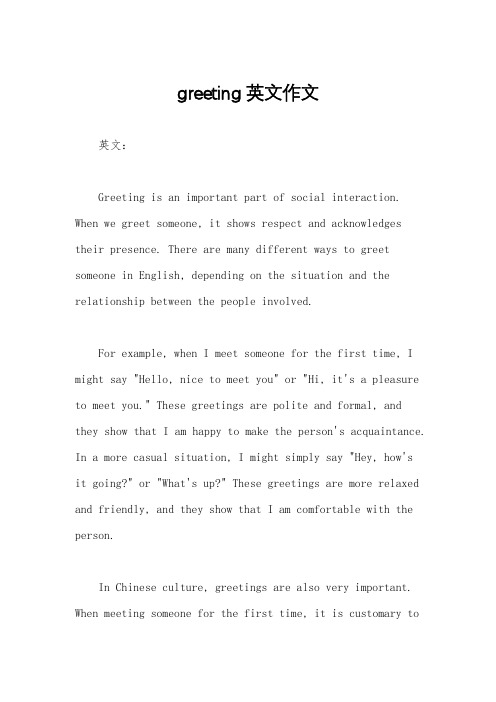
greeting英文作文英文:Greeting is an important part of social interaction. When we greet someone, it shows respect and acknowledges their presence. There are many different ways to greet someone in English, depending on the situation and the relationship between the people involved.For example, when I meet someone for the first time, I might say "Hello, nice to meet you" or "Hi, it's a pleasure to meet you." These greetings are polite and formal, and they show that I am happy to make the person's acquaintance. In a more casual situation, I might simply say "Hey, how'sit going?" or "What's up?" These greetings are more relaxed and friendly, and they show that I am comfortable with the person.In Chinese culture, greetings are also very important. When meeting someone for the first time, it is customary tosay "你好" (nǐ hǎo), which means "hello" in English. This is a polite and respectful way to acknowledge the other person. In more casual situations, people might use "嗨" (hāi) or "你好吗" (nǐ hǎo ma), which are equivale nt to "hi" and "how are you" in English.中文:问候是社交互动中的重要部分。
英语书信作文必备词汇

英语书信作文必备词汇在书写英语书信作文时,使用恰当的词汇至关重要,它可以让你的信件更加生动、清晰和礼貌。
下面是一些必备的词汇,可帮助你在书信中表达自己的意思:1. Greeting Words:Dear [Name],。
Hello [Name],。
Hi [Name],。
2. Opening Phrases:I am writing to you regarding...I am reaching out to you to...I would like to inquire about...3. Expressing Purpose:I am writing to express my gratitude for...I am writing to request information about...I am writing to apply for...4. Describing Situation:Currently, I am...At the moment, I am...5. Offering Help:If you need any further assistance, please do not hesitate to contact me.Please feel free to reach out if you require any additional information.I am more than willing to help in any way I can.6. Closing Phrases:Thank you for your attention to this matter.I look forward to hearing from you soon.Yours sincerely, [Your Name]Yours faithfully, [Your Name]7. Expressing Gratitude:Thank you for your time and consideration.I appreciate your prompt response.Your assistance in this matter is greatly appreciated.8. Apologizing (if necessary):I apologize for any inconvenience this may cause. Please accept my apologies for...9. Closing Salutation:Yours truly,。
年幼儿园小班英语教案《greeting》

年幼儿园小班英语教案《greeting》一、教学目标1.学习并掌握基本的英语问候语。
2.能够正确运用问候语与他人进行简单交流。
3.培养学生积极向他人问候的习惯。
4.提高学生对英语听力和口语的理解和表达能力。
二、教学重点1.学习常用的英语问候语。
2.运用问候语进行简单的交流。
三、教学内容1.英语问候语:–Good morning! 早上好!–Good afternoon! 下午好!–Hello! 你好!–Hi! 嗨!–How are you? 你好吗?–I’m fine. 我很好。
–Thank you. 谢谢你。
2.问候练习:–学生之间进行模拟对话练习,使用上述问候语进行交流。
四、教学过程1.初步讲解:–向学生介绍英语问候语,并讲解每个问候语的用法和含义。
2.练习环节:–教师示范英语问候语的正确表达方式,学生模仿跟读。
–学生之间进行角色扮演练习,用英语问候对话。
3.温故知新:–回顾已学习的英语问候语,让学生快速复习记忆。
4.拓展练习:–在课堂上设置小组活动,让学生自由发挥,编排问候对话并进行表演。
五、教学评估1.教师观察学生在练习环节中的表现,包括发音准确性、句子流利度等。
2.学生之间进行角色扮演后,互相评价并提出改进意见。
3.通过课堂小组活动的表演,评估学生对英语问候语的掌握程度。
六、课后作业1.练习英语问候语,并在家中与家人进行练习对话。
2.准备一段简短的英语问候对话,下节课进行表演。
七、教学反思本节课主要通过英语问候语的学习,培养学生积极向他人问候的意识和习惯,同时提高学生对英语口语的理解能力。
在教学过程中,要注重学生之间的互动和实践,通过大量的练习,使学生能够灵活运用所学知识,提高口语表达能力。
在今后的教学中,还可以结合更多生活场景,让学生更好地运用英语问候语进行实际交流。
以上是年幼儿园小班英语教案《greeting》的内容,希望通过本节课的学习,学生能够更好地掌握英语问候语,为今后的英语学习打下良好的基础。
五年级下册三年级起点英语书第一单元单词
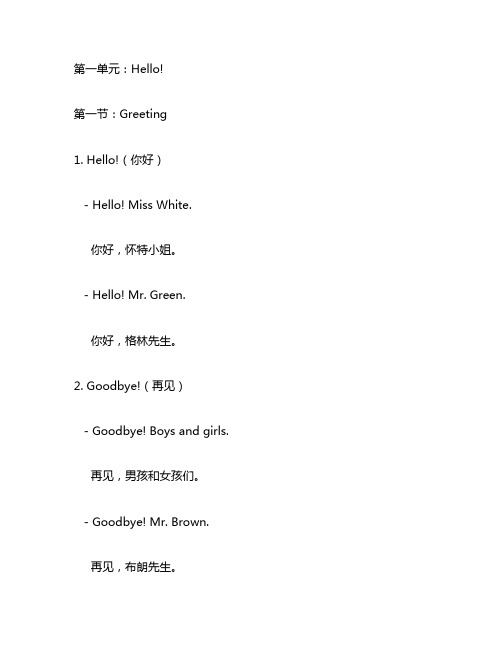
第一单元:Hello!第一节:Greeting1. Hello!(你好)- Hello! Miss White.你好,怀特小姐。
- Hello! Mr. Green.你好,格林先生。
2. Goodbye!(再见)- Goodbye! Boys and girls.再见,男孩和女孩们。
- Goodbye! Mr. Brown.再见,布朗先生。
3. Hi!(嗨)- Hi! Miss Black.嗨,布莱克小姐。
- Hi! Mrs. Smith.嗨,史密斯夫人。
第二节:Common phrases 1. How are you?(你好吗?) - How are you, Tom?汤姆,你好吗?- How are you, Mary?玛丽,你好吗?2. I'm fine, thank you.(我很好,谢谢) - How are you, Peter?你好吗,彼得?- I'm fine, thank you.我很好,谢谢。
3. What's your name?(你叫什么名字?) - What's your name, Lucy?露西,你叫什么名字?- My name is Lucy.我叫露西。
第三节:New words- teacher(老师)- classroom(教室)- student(学生)- desk(书桌)- ch本人r(椅子)- blackboard(黑板)- door(门)- window(窗户)- whiteboard(白板)- book(书)- pen(钢笔)- pencil(铅笔)- ruler(尺子)- bag(书包)- ball(球)- balloon(气球)- kite(风筝)- doll(玩具娃娃)- toy(玩具)第四节:ReviewLet’s review what we have learned in this unit.1. Greeting- Hello!- Goodbye!- Hi!2. Common phrases- How are you?- I'm fine, thank you.- What's your name? My name is…3. New words- teacher, classroom, student, desk, ch本人r, blackboard, door, window, whiteboard, book, pen, pencil, ruler, bag, ball, balloon, kite, doll, toy.Well done, boys and girls! See you next time! Goodbye!第五节:ConversationNow, let's practice some conversations using the new words and phrases we have learned.1. In the classroomA: Hello, Miss White.B: Hello, Lily. How are you today?A: I'm fine, thank you. What's your name?B: My name is Jack. Nice to meet you.A: Nice to meet you too.2. Getting ready for schoolA: Good morning, Mom.B: Good morning, Sarah. Are you ready for school? A: Yes, Mom. I have my bag, book, and pencil.B: That's great. Have a good day at school.A: Thank you, Mom. Goodbye!B: Goodbye, Sarah. Have a good day!3. Playing with friendsA: Hi, Tim. Do you want to play ball with me?B: Hi, Lisa. Yes, I'd love to play with you.A: Great! Let's go to the playground.B: Okay, let's go!This kind of practice helps students to build confidence and fluency when using the new words and phrases in real-life situations.第六节:Role PlayIn this section, we will do some role plays to help reinforce our understanding of the new words and phrases.1. Teacher and studentTeacher: Hello, class. Good morning.Students: Good morning, Miss White. Teacher: How are you today?Student 1: I'm fine, thank you.Student 2: I'm good, thanks.Teacher: What's your name, Peter?Peter: My name is Peter, Miss White.Teacher: Nice to meet you, Peter.Peter: Nice to meet you too, Miss White.2. At the classroomStudent 1: Please pass me the pen.Student 2: Here you go.Student 1: Thank you.Student 2: You're wee.3. PlaytimeChild 1: Hi, what's your name?Child 2: I'm Tom. What's your name?Child 1: I'm Sally. Do you want to play with the balloon?Child 2: Yes, I love balloons.Role play activities provide an interactive and engaging way for students to practice using the new vocabulary in different contexts.第七节:Listening and SpeakingIn this section, we will focus on improving our listening andspeaking skills through various activities.1. Listen and repeatStudents will listen to the teacher or recording and practice repeating the new words and phrases. This helps in correct pronunciation and intonation.2. P本人r workStudents will work in p本人rs to have short conversations using the new words and phrases learned. This promotes speaking and listening skills in a supportive environment.3. Picture descriptionStudents will describe a picture using the new vocabulary. This activity enhances speaking and listening skills, and also encourages creativity and storytelling.By incorporating listening and speaking activities, students can develop a deeper understanding of the new words and phrases and be more confident in using them in real-life situations.第八节:Writing PracticeNow, let's move on to some writing practice to reinforce the new words and phrases we have learned.1. Fill in the blanksStudents will be given sentences with missing words and will have to fill in the blanks with the appropriate new vocabulary.2. ShortpositionsStudents will be asked to write shortpositions using the new words and phrases. This encourages creativity and helps in consolidating the learning.3. DictationThe teacher will dictate sentences using the new vocabulary and students will have to write them down. This helps in spelling and reinforces memory of the new words and phrases.These writing practice activities 本人m to develop students' ability to use the new vocabulary in a written context and enhance their overall language skills.第九节:Review and AssessmentIt's time to review what we have learned in this unit and assess our understanding.1. Vocabulary quizStudents will participate in a quiz to test their knowledge of the new words and phrases learned in this unit.2. Oral assessmentStudents will have a one-on-one conversation with the teacher to demonstrate their understanding and usage of the new vocabulary.3. Written assessmentStudents willplete a written assessment including fill-in-the-blank exercises, shortpositions, and dictation to assess their writing skills and understanding of the new words and phrases.Through review and assessment, students can evaluate their progress and understanding of the new vocabulary, and teachers can identify areas for further support and development.ConclusionIn conclusion, the first unit of the Grade 3 English textbook has provided students with a foundation in simple greetings,mon phrases, and a range of new vocabulary. Through various activities such as conversation practice, role play, listening and speaking exercises, writing practice, and review and assessment, students have been able to engage with the new material in a meaningful and interactive manner. It is important for students to continue practicing and using the new words and phrases in order to build confidence and fluency in English languagemunication. By establishing a strong understanding of basic English vocabulary and language functions, students can progress to moreplex language skills and develop a solid foundation for future language learning. Good job, everyone! Keep up the great work!。
常见的英语问候语(正式与非正式场合的区别)

常见的英语问候语(正式与非正式场合的区别)我们读书时学过如何用英语打招呼问候,但是其实英语中的问候语有分正式和非正式场合,下面就来介绍下不同场合中如何用英语进行问候。
Greetings are used to say hello in English. It's common to use different greetings depending on whether you greet a friend, family or a business associate. When you meet friends, use informal greetings. If it's really important, use formal greetings. Formal greetings are also used with people you do not know very well.在英语中,问候语被用跟别人打招呼。
根据与你会面的是朋友,家人还是商业伙伴,我们常会使用不同的问候语。
如果确实是在重要的场合,我们会使用正式的问候语。
正式的问候语也可以用于那些不太熟悉的人。
Greetings also depend on whether you are saying hello, or you are saying goodbye.在打招呼或者告别的时候,我们使用的问候语也不同。
Learn the correct phrases using the notes below, and then practice using greetings with the practice dialogues.利用下面的提示,学习正确的短语用法,然后利用下面的对话来练习问候语。
Formal Greetings:Arriving正式问候语:到达Good morning / afternoon / evening.早上好/中午好/晚上好Hello (name), how are you?嗨(人名),你好吗?Good day Sir / Madam (very formal)先生/太太日安(非常正式)Respond to a formal greeting with another formal greeting.使用正式问候语来回应Good morning Mr. Smith.早上好,史密斯先生。
邮件里的英文常用语缩写
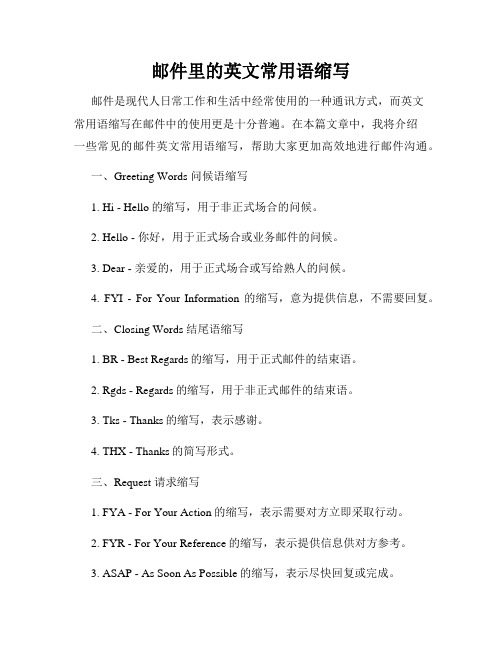
邮件里的英文常用语缩写邮件是现代人日常工作和生活中经常使用的一种通讯方式,而英文常用语缩写在邮件中的使用更是十分普遍。
在本篇文章中,我将介绍一些常见的邮件英文常用语缩写,帮助大家更加高效地进行邮件沟通。
一、Greeting Words 问候语缩写1. Hi - Hello的缩写,用于非正式场合的问候。
2. Hello - 你好,用于正式场合或业务邮件的问候。
3. Dear - 亲爱的,用于正式场合或写给熟人的问候。
4. FYI - For Your Information的缩写,意为提供信息,不需要回复。
二、Closing Words 结尾语缩写1. BR - Best Regards的缩写,用于正式邮件的结束语。
2. Rgds - Regards的缩写,用于非正式邮件的结束语。
3. Tks - Thanks的缩写,表示感谢。
4. THX - Thanks的简写形式。
三、Request 请求缩写1. FYA - For Your Action的缩写,表示需要对方立即采取行动。
2. FYR - For Your Reference的缩写,表示提供信息供对方参考。
3. ASAP - As Soon As Possible的缩写,表示尽快回复或完成。
4. PFA - Please Find Attached的缩写,表示附件已经在邮件中。
四、Confirmation 确认缩写1. AFAIK - As Far As I Know的缩写,表示就我所知。
2. BTW - By The Way的缩写,表示顺便提一下或转折话题。
3. RSVP - Répondez S'il Vous Plaît的缩写,表示请回复。
4. TBC - To Be Confirmed的缩写,表示待定。
五、Apology 道歉缩写1. SRY - Sorry的缩写,表示对某事道歉。
2. Apol - Apology的缩写,表示道歉。
英语作文问候寒暄的话

英语作文问候寒暄的话Greetings and Small Talk。
Greetings are an important part of social interaction. They are a way of acknowledging someone's presence and showing respect. Small talk, on the other hand, is a way of building rapport and establishing a connection with someone. In this essay, we will explore the different ways ofgreeting someone and engaging in small talk.Greetings。
There are many ways of greeting someone in English, depending on the situation and the relationship between the speakers. Here are some common greetings:1. Hello: This is the most common greeting in English.It is a neutral greeting that can be used in any situation.2. Hi: This is a more informal greeting that is oftenused between friends or acquaintances.3. Good morning/afternoon/evening: These greetings are more formal and are often used in professional settings.4. How are you? This is a common greeting that is often used to start a conversation. It is important to note that this is not a question about someone's health, but rather a way of showing interest in their well-being.Small Talk。
- 1、下载文档前请自行甄别文档内容的完整性,平台不提供额外的编辑、内容补充、找答案等附加服务。
- 2、"仅部分预览"的文档,不可在线预览部分如存在完整性等问题,可反馈申请退款(可完整预览的文档不适用该条件!)。
- 3、如文档侵犯您的权益,请联系客服反馈,我们会尽快为您处理(人工客服工作时间:9:00-18:30)。
金玉满堂:Treasures fill the home
生意兴隆:Business flourishes
岁岁平安:Peace all year round
恭喜发财:Wishing you prosperity
和气生财:Harmony brings wealth
心想事成:May all your wishes come true
吉祥如意:Everything goes well
国泰民安:The country flourishes and people live in peace 招财进宝:Money and treasures will be plentiful
一帆风顺:Wishing you every success
步步高升:Promoting to a higher position
出入平安:Safe trip wherever you go
郎才女貌talented guy and beautiful lady
天缘巧合a destiny given by heaven and a wonderful match 天作之和a match by heaven
心心相印a complete meeting of minds
永结同心to be of one mind forever
相亲相爱to be kind and love to each other
百年好合a harmonious union lasting a hundred years
永浴爱河bathe in a river of love forever
佳偶天成an ideal couple
百年琴瑟married couple for a hundred years
百年偕老(of a married couple) to stick to each other for a hundred years
花好月圆the flowers are in full bloom, and the moon is full-ideal time for wedding
福禄鸳鸯a happy wealthy couple
天缘巧合a destiny given by heaven and a wonderful match
美满良缘a happy and wonderful marriage
夫唱妇随the man sings, the wife follows - domestic harmony
珠联璧合an excellent match
凤凰于飞a couple of phoenixes on the wing-happy marriage
美满家庭a happy family
琴瑟和鸣marital harmony; happy married life
相敬如宾(of a married couple) to respect each other as if the other were a guest
同德同心to be of one mind
宜室宜家to make a harmonious and orderly home breath
鸾凤和鸣harmony in marriage
白头偕老(of a married couple) to stick to each other till the hair turns gray
情投意合to be congenial; to agree in taste and temperament
花开并蒂a good marriage
美满良缘A happy and wonderful marriage
鸾凤和鸣
1,Luan and Phoenix Sing together 2,Harmony in marriage。
